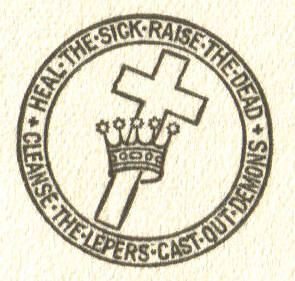Christian Science
Christian Science is a set of beliefs and practices belonging to the metaphysical family of new religious movements. It was developed in the United States in the 19th century by Mary Baker Eddy, who argued that sickness is an illusion that can be corrected by prayer alone. The book Science and Health with Key to the Scriptures, written by Eddy in 1875, is considered the central text of Christian Science.
Beliefs and Practices[edit | edit source]
Christian Science teaches that the all-encompassing nature of God means that reality is purely spiritual and that the material world is an illusion. This belief extends to the view that sickness and sin are not ordained by God and can be overcome by understanding one's spiritual nature. The practice of healing through prayer is a central feature, with practitioners often eschewing traditional medicine in favor of spiritual healing.
Prayer in Christian Science is not about asking God for help but about affirming the truth of God's perfect creation and denying the reality of illness or sin. Christian Scientists often meet for public worship in structures called Church of Christ, Scientist. Services are led by lay members since the church does not have a clergy. The Bible and Science and Health are both considered pastor of the church.
Organization[edit | edit source]
The Church of Christ, Scientist is headquartered in Boston, Massachusetts, and has branches worldwide. The church is organized democratically, with all major decisions made at the annual meeting of its members. The Christian Science Publishing Society publishes several periodicals, including The Christian Science Monitor, a well-regarded international newspaper.
Controversies[edit | edit source]
Christian Science has been the subject of controversy, particularly regarding its stance on medical care. Critics argue that the reliance on prayer over conventional medicine has led to preventable deaths. In response, the church has maintained that individuals are free to seek medical treatment if they choose, and it has made efforts to prevent misunderstandings of its teachings.
Influence[edit | edit source]
Despite its controversies, Christian Science has made significant contributions to American culture and religious thought. Its emphasis on spiritual healing has influenced the broader New Thought movement and the development of mind-body-spirit healing practices. The Christian Science Monitor, founded by Eddy in 1908, has received numerous awards for its journalism and is respected for its nonpartisan reporting.
Conclusion[edit | edit source]
Christian Science represents a unique blend of American religious innovation, metaphysical beliefs, and the quest for spiritual healing. Its teachings on the nature of reality and the power of prayer continue to attract followers, even as the church faces challenges in the modern world.
Search WikiMD
Ad.Tired of being Overweight? Try W8MD's physician weight loss program.
Semaglutide (Ozempic / Wegovy and Tirzepatide (Mounjaro / Zepbound) available.
Advertise on WikiMD
|
WikiMD's Wellness Encyclopedia |
| Let Food Be Thy Medicine Medicine Thy Food - Hippocrates |
Translate this page: - East Asian
中文,
日本,
한국어,
South Asian
हिन्दी,
தமிழ்,
తెలుగు,
Urdu,
ಕನ್ನಡ,
Southeast Asian
Indonesian,
Vietnamese,
Thai,
မြန်မာဘာသာ,
বাংলা
European
español,
Deutsch,
français,
Greek,
português do Brasil,
polski,
română,
русский,
Nederlands,
norsk,
svenska,
suomi,
Italian
Middle Eastern & African
عربى,
Turkish,
Persian,
Hebrew,
Afrikaans,
isiZulu,
Kiswahili,
Other
Bulgarian,
Hungarian,
Czech,
Swedish,
മലയാളം,
मराठी,
ਪੰਜਾਬੀ,
ગુજરાતી,
Portuguese,
Ukrainian
Medical Disclaimer: WikiMD is not a substitute for professional medical advice. The information on WikiMD is provided as an information resource only, may be incorrect, outdated or misleading, and is not to be used or relied on for any diagnostic or treatment purposes. Please consult your health care provider before making any healthcare decisions or for guidance about a specific medical condition. WikiMD expressly disclaims responsibility, and shall have no liability, for any damages, loss, injury, or liability whatsoever suffered as a result of your reliance on the information contained in this site. By visiting this site you agree to the foregoing terms and conditions, which may from time to time be changed or supplemented by WikiMD. If you do not agree to the foregoing terms and conditions, you should not enter or use this site. See full disclaimer.
Credits:Most images are courtesy of Wikimedia commons, and templates, categories Wikipedia, licensed under CC BY SA or similar.
Contributors: Prab R. Tumpati, MD





